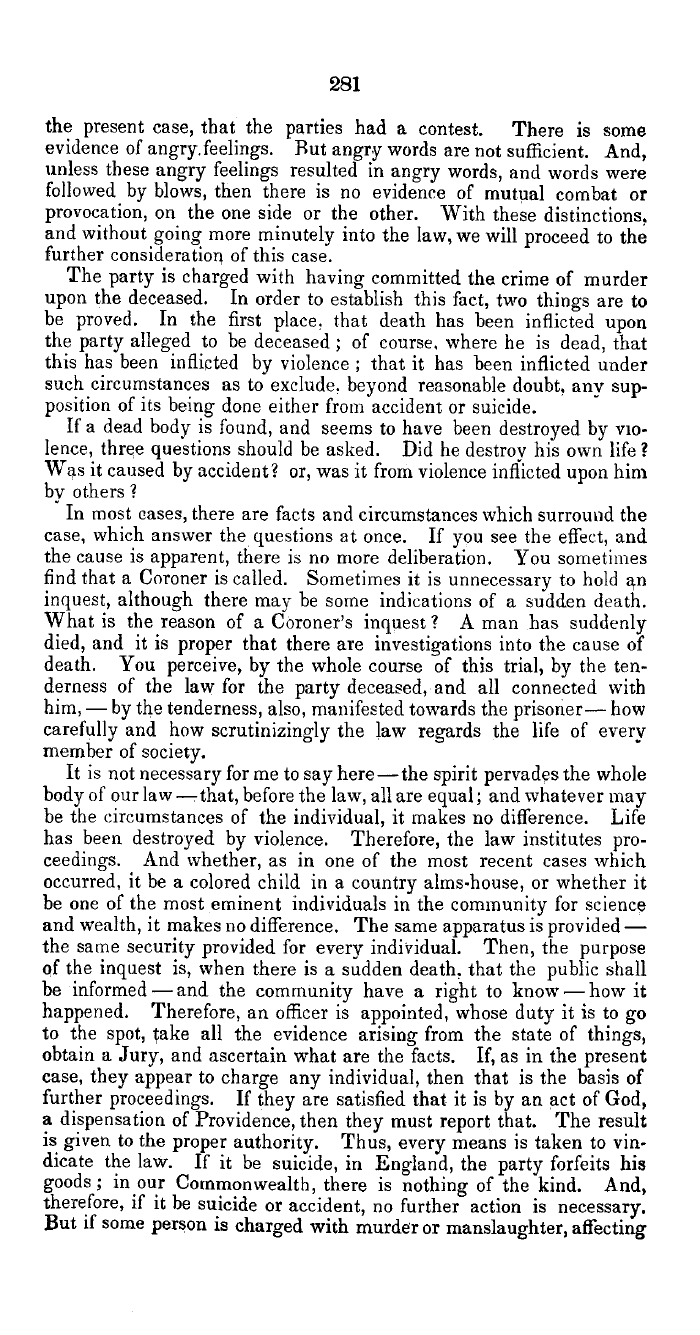|
281
the present case, that the parties had a contest. There is some
evidence of angry.feelings. Rut angry words are not sufficient. And,
unless these angry feelings resulted in angry words, and words were
followed by blows, then there is no evidence of mutual combat or
provocation, on the one side or the other. With these distinctions,
and without going more minutely into the law, we will proceed to the
further consideration of this case.
The party is charged with having committed the crime of murder
upon the deceased. In order to establish this fact, two things are to
be proved. In the first place. that death has been inflicted upon
the party alleged to be deceased ; of course, where he is dead, that
this has been infliQted by violence ; that it has been inflicted under
such circumstances as to exclude. beyond reasonable doubt, any sup-
position of its being done either from accident or suicide.
If a dead body is found, and seems to have been destroyed by vio-
lence, three questions should be asked. Did he destrov his own life ?
Was it caused by accident? or, was it from violence inflicted upon him
by others ?
In most cases, there are facts and circumstances which surround the
case, which answer the, questions at once. If you see the effect, and
the cause is apparent, there is no more deliberation. You sometimes
find that a Coroner is called. Sometimes it is unnecessary to hold an
inquest, although there may be some indications of a sudden death.
What is the reason of a Coroner's inquest ? A man has suddenly
died, and it is proper that there are investigations into the cause of
death. You perceive, by the whole course of this trial, by the ten-
derness of the law for the party deceased, and all connected with
him, - by the tenderness, also, manifested towards the prisoner- how
carefully and how scrutinizingly the law regards the life of every
member of society.
It is not necessary for me to say here-the spirit pervades the whole
body of our law-that, before the law, all are equal; and whatever may
be the circumstances of the individual, it makes no difference. Life
has been destroyed by violence. Therefore, the law institutes pro-
ceedings. And whether, as in one of the most recent cases which
occurred, it be a colored child in a country alms-house, or whether it
be one of the most eminent individuals in the community for science
and wealth, it makes no difference. The same apparatus is provided-
the same security provided for every individual. Then, the purpose
of the inquest is, when there is a sudden death. that the public shall
be informed-and the community have a right to know-how it
happened. Therefore, an officer is appointed, whose duty it is to go
to the spot, take all the evidence arising from the state of things,
obtain a Jury, and ascertain what are the facts. If, as in the present
case, they appear to charge any individual, then that is the basis of
further proceedings. If they are satisfied that. it is by an act of God,
a dispensation of Providence, then they must report that. The result
is given to the proper authority. Thus, every means is taken to vin-
dicate the law. If it be suicide, in England, the party forfeits his
goods ; in our Commonwealth, there is nothing of the kind. And,
therefore, if it be suicide or accident, no further action is necessary.
But if some person is charged with murder or manslaughter, affecting
|

